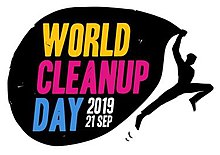Jack’s amazing story
World Clean Up Day 2020
World clean-up day is celebrated this year on 19 September, and this is an ideal opportunity to remind us we can still do our part by carrying out our own ‘individual’ clean-ups and by considering our behaviour with regards to waste management and resource use at home, at work and when undertaking Scouting activities. Ideas for getting involved are as simple as:
- Picking up a piece of litter or two when you’re out and about
- Organising a clean-up in your local area.
- Making sure that you take personal responsibility for disposing of your litter.
We can take inspiration from Jack Miles a member of the Meyer Explorer Unit, Cotswold Vale who has pledged to undertake 100 litter picks in and around his home village to raise monies towards his EuroJam experience and to help the environment. Jack has reach litter pick #73.
Well done to Jack
During the pandemic there has been a significant increase of single use plastic due to the use of PPE for protection against covid-19.
While protective measures are required to keep everyone safe, we can still do this sustainably by wearing reusable masks. We can also ensure that waste items are disposed of correctly – covid-19 PPE waste should be placed in general waste bins to avoid contamination of recyclables.
As of 2015, 6.3 billion tonnes of plastic waste was deposited in landfills and the natural environment, with only nine per cent of plastic waste being recycled. If current trends continue, 12 billion tonnes of plastic will be deposited in the environment as waste by 2050. Litter in the natural environment can be the result of accidental releases, poor waste practices, or wilful disregard.
An estimated 4.5 trillion cigarette butts are littered globally each year, making them the planet’s most pervasive form of plastic pollution. Dropping cigarette ends seems to be socially acceptable, but they cause serious damage to the environment as most cigarette filters are made of cellulose acetate fibre, a type of a bioplastic.
Most common waste types on UK beaches (items per 100 million, 2015 Survey):
- Plastic and polystyrene pieces (225)
- Packets (42)
- Glass items (40)
- Cigarette ends (35)
- Caps and lids (33)
- String/cord (31)
- Wet wipes (27)
- Cotton buds (27)
- Fishing line (18)
- Cutlery/trays/straws (18)
These items break down slowly in the environment and can be directly harmful to wildlife through entanglement or ingestion.
Below are links to related articles which you may find interesting:
